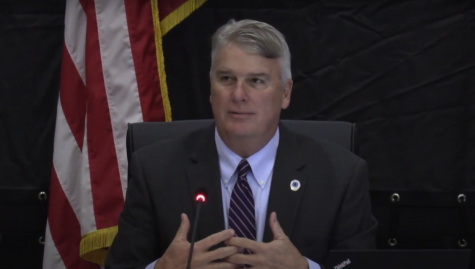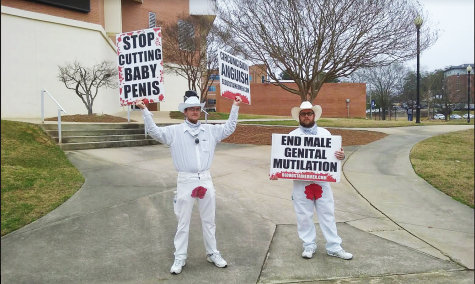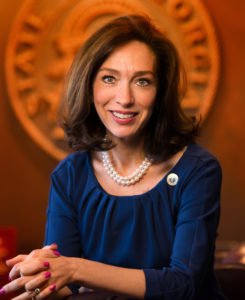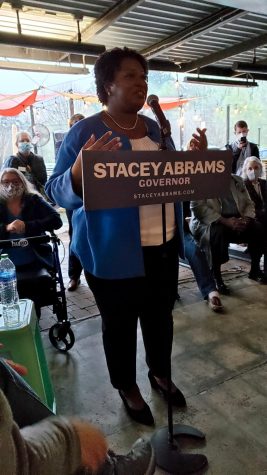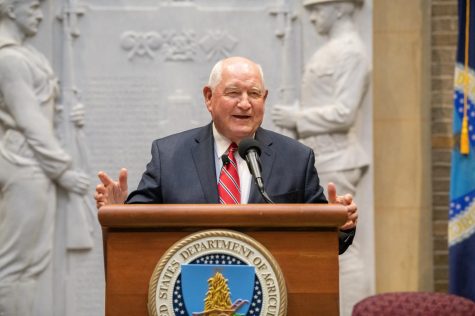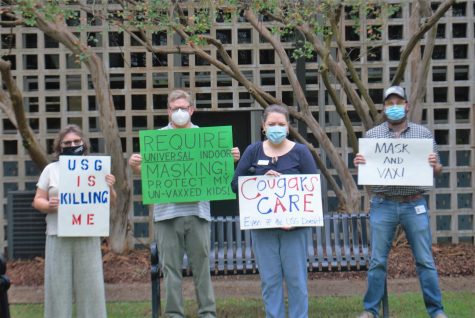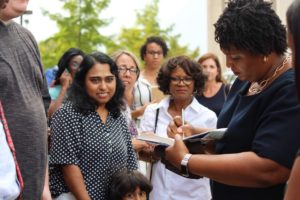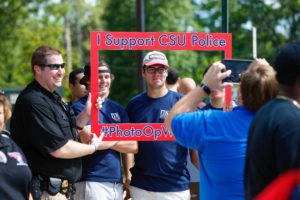A Conversation with the Candidates of Senate District 29
Candidates Valerie Haskins and Randy Robertson share their views
The race for Georgia’s 29th Senate district is heating up. Election day is Nov. 6, and early voting in Georgia has already begun. The 29th district is comprised of a small piece of Muscogee county at the district’s southern end and runs into the counties of Harris, Meriwether, and Troup. Two candidates have qualified for this race to replace Josh McKoon (R), the senator from this district since 2011. McKoon ran a failed bid for the job of Georgia Secretary of State to replace outgoing secretary Brian Kemp, leaving his seat vacant for the race between Randy Robertson (R) and Valerie Haskins (D). I sat down for an interview with both candidates and discussed issues important to Columbus State University Faculty and students.
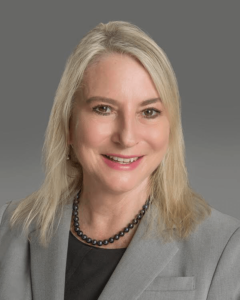 VALERIE HASKINS
VALERIE HASKINS
Valerie Haskins is a licensed teacher and community activist who lives in Manchester, Georgia. She is president of the Manchester-Warm Springs Pilot Club and a contributor to the Manchester Star-Mercury. A graduate of the University of Southern Mississippi and the University of South Florida, she has taught in public schools in Florida, Germany, and Georgia.
Q&A
Ryan Hutto: So we’re going to talk a little bit about the rising costs of education, because that’s something that really applies heavily to Columbus State University students. The cost has tripled in the last 30 years. College education costs – as far as tuition fees and everything else – have skyrocketed. What can you do as a representative from 29th senate district to help Georgia students defray those costs?
Valerie Haskins: Well, I am a public-school teacher – I have taught in Florida. I’ve taught for DOD (Department of Defense) in Germany. I taught here in Meriwether County, so education is something that is very valued by me. I was the first person in my family to go to college. It wasn’t thought possible to go to college while I was growing up in the sixties. Women had not yet achieved their full rights to go to school. I got married young and found a pathway to go to college. As a single mom with three kids in my early thirties, I finished my bachelor’s degree. The Pell grant, of course, helped me out a lot. I went on to get my master’s degree. So, through many obstacles, I achieved an education that changed my life, and I truly want to support pathways to education. I see that we need to enhance the HOPE scholarship and make it a more needs-based program. I would also like to see the HOPE grant available for students who wish to attend technical colleges so more people could go to technical schools and have a debt-free education.
Ryan Hutto: My follow-up question deals with protecting the HOPE scholarship and grant for the future. How do you feel about that?
Valerie Haskins: I definitely believe it needs protecting, and I would like to expand it as much as possible.
Ryan Hutto: Let’s stick with an economics-based question and move to health care. Discuss what you believe your role is as a representative from SD-29 to help your constituents with healthcare costs.
Valerie Haskins: One of the reasons I got into this campaign is because I live in a rural area, and my husband is a physician. I live in an area where I see the needs for healthcare. It is paramount that we expand Medicaid in the state. These are dollars that Georgians have already paid into the system that are just waiting to come back to the state.
14 years under the GOP leadership, we have lost seven rural hospitals. Those have all closed in the last five years. Seven rural hospitals have closed their doors. So, by expanding Medicaid, we get federal dollars into Georgia. For every dollar Georgia has already put in, the return is $9 in federal money. What we get back is so much more.
People that are uninsured right now, they wait until they have an emergency and go to the emergency room. These are usually cases of indigent care where the taxpayers must take care of those medical expenses which are not paid by any insurance company. When someone is insured, they have access to preventative care. They have their healthcare costs covered at the hospital. They will be healthy people able to work and be productive members of society. Another thing is that Medicaid expansion also, like in the state of Kentucky when they expanded Medicaid, it produces jobs and keeps jobs open.
When hospitals stay open, jobs are open – nurses, doctors. So to me, my number one priority is Medicaid expansion. This expansion could insure somewhere around 473,000 Georgians, and I estimate about 15,000 of those would be in my district. People that fall in the insurance gap – I was speaking to a lady the other day at a Breast Cancer walk; she’s a breast cancer survivor, and she is in that gap. She makes too much for Medicaid and has purchased her insurance from the Affordable Care Act’s exchanges. She was just told that they are no longer going to carry that insurance for her anymore. She will have no insurance after January. She is definitely someone who will benefit from the expansion of Medicaid. 22 percent of women in this state are not insured by any health insurance. Getting Medicaid expansion in this state is just a win-win situation.
Ryan Hutto: So we talked about job creation with healthcare – do you have any figures on what that job creation would look like?
Valerie Haskins: With Medicaid expansion, those dollars would support and help keep our rural hospitals open. In Kentucky, their Medicaid expansion created over 40,000 jobs. I will tell you this – I am a democrat. A lot of these issues are not left and right issues; these are human being issues. I have many Republicans voting for me. There is a lady in the district that told me, “I’m a Republican. I’ve never voted for a Democrat. Here is a $100 check, and I want three yard signs.”
Now she’s writing hundreds of postcards for me. That’s because they know me and know what I do. I’ve had several that don’t know me who are just tired of what’s been going on. So I’m the kind of person that wants to close the divisiveness and focus on things that affect people every day in their daily lives. When you go home at night and sit around the kitchen table, the issues are jobs and a living wage. Healthcare, when I canvas, is what everyone is talking about. We need to make it more available and work somehow to get these costs down. I’ve experienced high hospital bills firsthand.
Ryan Hutto: Let’s talk about guns, the Second Amendment, and where you fall on these issues. Specifically, laws like campus carry and arming teachers.
Valerie Haskins: First, I want to say I support the Second Amendment. I carry a copy of the Constitution in my purse. My parents had a rifle in the home when I was a child. They taught and emphasized gun safety and awareness. There should be more education about gun safety, especially when there are children involved.
I think we need common sense gun legislation. Moms Demand Action has endorsed my campaign, because I feel strongly about common sense reforms to our gun laws. Campus carry – I’d like to see that repealed, and as an educator and sometimes student who has been in many classrooms, I absolutely don’t want to arm teachers. More guns do not make us safer. Teachers have enough on their plate handling 30 kids. Absolutely not on arming teachers.
Ryan Hutto: How do you feel about school vouchers?
Valerie Haskins: I’m a big proponent of our public schools. I went to public school, and I believe that is a treasure in this country. I believe that we must support our public schools, that it is an investment for our future. I am concerned about any voucher program that would take money from our public schools.
In rural areas, this is a big consideration because they don’t have the same choices. I will say, however, that I support fully funding our public schools every year under the current QBE (Quality Basic Education) formula that decides the amount of funding given to the schools each year. This formula has not been updated since 1985.
Our schools have not been fully funded schools since 2004. Can you imagine waiting for a paycheck every year and it just doesn’t come? That’s the situation in our schools. I will support fully funding and reworking the QBE formula so that it fits the needs better. There’s an inequality with many of the rural schools that support many students living in poverty.
I’m for fair and equitable education. My focus is healthcare and job creation so that these kids can go to school on a more level playing field. It would be great if their parents could work one job instead of multiple part-time jobs. It would allow them to be home at night with their children to get them ready for school the next day
Ryan Hutto: Final Question: what, in your opinion, is the most important issue facing the state of Georgia and your district in particular in this legislative session?
Valerie Haskins: I have three things I want to focus on in our district in this legislative session:
1. Healthcare – Medicaid Expansion is number one. A healthy population is a working population. That will help jobs, people’s health, keep rural hospitals open, and keep children insured and grant access to preventative care. Georgia has the highest maternal death rate as well, and providing more consistent OB/GYN care for women is absolutely key to fixing this.
2. Education – I want to work and make sure these schools are taken care of and fully funded. Healthcare and education in these rural counties will help to attract industry.
3. Broadband internet for the rural areas – There’s a study committee that agrees that we need rural broadband expansion but have not decided how to fund it. We would obviously need federal support and funding to help with the project. But it must remain a priority in this legislative session. The broadband issue ties to healthcare and education. Kids at Manchester High School have to go to McDonald’s to do their homework.
I feel like these three issues tie together, and if we focus on them and prioritize them, then I believe we can improve District 29.
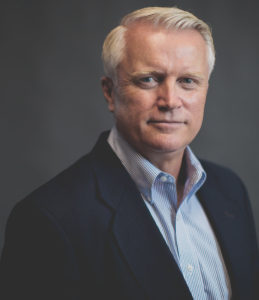 RANDY ROBERTSON
RANDY ROBERTSON
Randy Robertson is a resident of Harris County and served within Columbus law enforcement for 30 years. Randy is 56 Years old and has been an active member of the Fraternal Order of Police, serving as the chapter president for Columbus for 15 years and two years as president of the state chapter of the FOP.
Q&A
Ryan Hutto: In 30 years or so, the cost of higher education has tripled fees, and tuition costs have skyrocketed – What do you believe is your responsibility as a senator to reign in those costs and help students in the state of Georgia?
Randy Robertson: Well, I think the thing we should really look at is exactly where that money is being spent. Is the money being invested back into the product, i.e. the student, or is the money being placed into those grandiose projects? So when you look at campuses, to use Columbus State University as an example, when you’re seeing investments, let’s say in downtown that not only increase the college’s profile, but at the same time gives the student a better learning experience and a better opportunity – then I could say that yes, I support that 100 percent. But if it’s something that’s just on basically to make it appear that the trustees for the university or the trustees who are responsible for the universities on the state level or just trying to pay a little bit of tribute to themselves, then I think there’s a problem. One of my concerns is I feel that the HOPE scholarship, as beautiful as it was the day it was set up, continues to be a pot of money like the honey that draws the flies. I think what we need to do is get back to the principles that Governor Miller established when he came up with the idea and make sure that that money is being used to educate not only the student coming out of high school but the adult learner and those others that wish to better and better their lives. People can overcomplicate it, but it’s money management.
Ryan Hutto: We talked a little bit about the HOPE scholarship, and in its current form, it is merit-based. How do you feel about expanding to a need-based structure?
Randy Robertson: I have no problem with need-based assistance. It has to be a moving forward, something we look at. But we have to be extremely careful that that need is not based on a discriminatory factor. In other words, it can’t be race-based, it can’t be gender-based; it needs to be legitimate economic need-based. But at the same time, there has to be some established guidelines that shows or attempts to show the drive and potential of that student with an economic need. You’ll see a lot of programs where if a family or individual makes this amount of money a year, then they qualify. Well, there’s a lot more to that individual than just a number. Some students, living with parents or family, might have the ability to do more than, say, if you were out on your own making that same amount of money trying to better your life. Whether you were male, female, black, white or brown, gay, straight, Muslim or Christian, it should have no impact; it should just be strictly based on a blind application of need.
Ryan Hutto: So no affirmative action-type programs?
Randy Robertson: Exactly, if traditional affirmative action. Absolutely. I think we’ve had certain phrases, if you think about it. You and I are sitting here, talking about something, and say, well, here’s the problem. You need to take some affirmative action on. We have a lot of great phrases that have been hijacked by terrible things.
Ryan Hutto: Moving on. We’re going to talk a little bit about healthcare. It’s a major concern in this state and this district. What do you think we should do?
Randy Robertson: I’ve spoken to cardiologists, primary care physicians, RNs, LPNs, and the largest area we need to improve in to lower healthcare costs by 70 percent is obesity and just the everyday lifestyle that Americans tend to overindulge. So, what I think you’d have to do is start by looking at healthcare in a micro sense tied to the individual’s responsibility. I think we, my opponent and I, differ on Medicaid expansion. She is for a radical Medicaid expansion, and I’ve discussed this in debates, and some of her supporters have either misunderstood what I said or intentionally misquoted what I said. But if we were to expand Medicaid now in the format that the Bernie Sanders and Hillary Clintons and some of the others on the other side want to do, what they would do is, and I don’t know what your annual income is, but let’s say if your annual income is less than $16,000 a year as a college student – you would qualify under this Medicaid expansion. Medicaid was established for children, the elderly, and the disabled. So what that will do is that would qualify you for Medicaid. You would walk into the waiting room and possibly displace a child, a disabled person, or an elderly person. Another problem with Medicaid right now is it underpays physicians. You and I would not go out and do our job for less than what we value our effort. So why should we expect that from some of the most important people in our lives? They’re that important to us, but to go in there and pay them a fraction of the value of the service they’re offered with the education that they had to go out and visit. Several years ago, it was discovered that the state of Georgia had overpaid the federal government millions of dollars in reimbursements. So the federal government sends that money back to the state of Georgia. Governor deal takes 30 some odd million dollars and he sends them to Mercer, to the medical school. Mercer could have done anything they wanted to with that money. What they did is they set up an account called it the Nathan Deal Scholarship. What Mercer will do for a student wanting to go to medical school is if that student is willing to graduate within three years and then spend, I believe, three years in rural health care, then Mercer uses that money to pay 100 percent of that student’s tuition. Now they’ve started opening, and the first one opened in Plains (I guess about a month or so ago), and I’m hoping the second one will be in Harris County, but they opened Mercer clinics which are staffed by these rural healthcare physicians, and it has every service to include telemedicine so that residents can come in and speak to specialists via satellite or streaming video for any specialists that may not be housed there at that clinic. These new physicians come in under the tutelage of a seasoned physician at the clinic. These populations in rural Georgia like Harris County and parts of Meriwether County then have access to health care from a physician who doesn’t have student debt and can afford to work in rural health care instead of automatically leapfrogging to Atlanta where he or she could make quite a bit more money, but because they obligated themselves to three years for a free education. The underserved community with the rural Georgia wins, while at the same time that that physician hopefully develops the skills they need to be the best doctor they can possibly be and hopefully develop relationships so that after three years, they say, “Hey, you know what? I want to stay here. This is where I’ve established a reputation. This is where I have friends,” and so then we alleviate the healthcare shortage that exists in rural Georgia.
Ryan Hutto: Part of the argument for Medicaid expansion, though, is that the $3 billion is already earmarked for Georgia, and 33 other states have taken their part of it. It would come into the state and bring a lot of jobs with it and also help those underserved communities that you’ve mentioned continue to have rural hospitals. So this money that’s already earmarked under the Affordable Care Act (ACA) – it’s been fought about for 6 or 7 years now. But the money is already earmarked. Why not take it?
Randy Robertson: Well, my problem is I don’t think it’s going to be enough in the long run. Let’s understand: it is tax dollars. It’s our money, already. It’s all taxes. My concern is that the jobs it talks about bringing. I mean, anybody can give money to something and say, “Hey, along with this money, we’re going to create jobs,” and we’ve seen it happen with tax credits and everything else where it’s really rosy for a while, but when the profits and when, again, those physicians who say, “Hey, you could bring $50 million in here, and if you’re still going to pay me $125 for $500 procedure, I’m not going to see those patients.” Creating jobs is always a safe argument. But once we start drilling down, we’ve seen the state government itself has built departments with intention, with the perfect intent to help the citizens, and they’re bloated with a whole lot of employees. You and I know I could walk down to the health department building now and walk through, and we could see evidence of that mismanagement of funds, and again, those funds are our tax dollars paid for by the citizens of the 29th district and throughout the state of Georgia. I just think on Medicaid expansion, when somebody throws out the desire to expand Medicaid, and they say, “Hey, look – there’s just big pot of money sitting there.” Well, once that pot of money’s gone, it’s gone. I think the number that [Health and Human Services] HHS asked for this year to maintain – I don’t have the information, but I believe I’m right and [House Speaker Representative] Richard Smith will be [the one to ask], but I believe it’s around $250 million dollars just to maintain what we have. So it’s… it’s a huge burden on the state budget. And then, you add the burden on top of that. I think what we… I think a better solution… maybe look at those families that currently qualify for men – offer tax credits to those families to buy traditional health insurance. I’m a supporter of being able to buy health insurance across state lines. I’m for free markets. If Joe Smith Insurance in Enterprise, Alabama offered me a better deal than Bob Jones Insurance in Columbus, Georgia, then I should be able to go to Enterprise, Alabama about my health insurance. Let’s make it competitive. If the insurance companies want to overcharge, then let them do it. But we also have had better communication between healthcare providers and the insurance so that the insurance companies understand the investment of the healthcare community, because I think there are times when those two sides don’t talk, and the only people punished by that lack of conversation are you and I and other people that depend on the healthcare system to take care of those.
Ryan Hutto: Let’s pivot and talk about the Second Amendment. I know you’re a former law enforcement officer.
Randy Robertson: Still POST certified and still teach.
Ryan Hutto: So you may have a little bit of a different opinion than traditional Republicans. How do you feel about bills like campus carry, arming teachers in schools?
Randy Robertson: I’ll be honest with you, and we’ll jump to the hornet’s nest right off. Arming teachers in school… I feel that that’s a school district decision. I see the Muscogee County School District is now about to apparently implement a police department that serves the school district. I teach a firearm familiarization course for families. Because what we find is a lot of families will go out and buy a firearm and the ammunition they need. They’ll take it home and put it away. They bought it because they read the magazine that it was a really good gun. They bought the ammunition because dad read in the same magazine it was the best ammunition. Dad never loads the weapon, or if he does, he never fires the weapon. So basically, what they have there is a very lethal paperweight sitting in their house. We don’t try to teach them to be a marksman; we just try to teach them how to be familiar with that particular weapon. My wife carries a weapon, and it’s a revolver because she’s a small female – small hands and an automatic does not work. So if the school district wanted to arm certain teachers with firearms, and they said, “You know, Randy, we’re going to do this,” what would you recommend as far as policy? I would recommend as much training as any law enforcement officer would get, not only in the use of a firearm, the de-escalation and judgmental use of deadly force and the required qualifications on a semiannual basis over two or three times a year. These teachers have to do that, but that has got to be a decision made by the school board, and that decision is going to be swayed a lot by the constituents within that county that elect those school board members saying, “Hey, I don’t want that in my school” or “Yes, we do want it in our schools.” It’s something that if the school district does decide to implement that, it should be done with a lot of planning and a lot of forethought. Campus carry, I think the way the legislation was written, some parts of it are good as far as guaranteeing the Second Amendment right. I think they split some hairs on some things that make it almost difficult for administration on campuses to understand what they can and can’t do because I don’t think we should ever take away the power of managing campus safety from those responsible for campus safety, not only for the safety of the students but for the liability involved. These [university] presidents and others accept a great deal of liability with 30,000 souls moving onto an open campus on a daily basis. I do support the Second Amendment. I think the background checks, as they currently exist, need to be reviewed. I think we need to make sure we have robust and aggressive background checks. I think we need to address mental health services. I think we need to encourage and educate the families on their responsibilities if they have a family member who is a gun owner, who has severe mental health issues, as far as what their rights are, for approaching probate court and other courts to try to make the courts aware of this individual, the possible dangers that exist so that these weapons can be removed. The problem we’ve gotten into over the past several years with rhetoric and fire and brimstone is that everybody’s looking for the quick fix. We have all the screaming and yelling from both sides. We have disingenuous numbers being screamed about on both sides. We’ve lost our ability to have a civil conversation people have allowed their pride to get in the way. Where I can no longer say, “Hey, you know what? You’re right. I never knew that and that’s going to change the way I feel about that.” Everybody thinks that’s a loss. I don’t. I think that we win every time we move the needle and land on a better solution. We’ve become so polarized in the United States and in Georgia, especially during this election. We’ve got to get beyond that and understand the reason we’re doing this. It’s not about me – it’s about the men, women, and children that live in district 29, period.
Ryan Hutto: What do you think is the most important issue facing the state of Georgia in the next legislative session and your district in particular?
Randy Robertson: The most important issue – and it’s not sexy like everybody thinks – but the most important issue facing district 29 in this next election is the expansion of broadband internet. Broadband impacts our health care system, impacts our education system, and impacts business and economic development. We have students in Meriwether County who have to stop at McDonald’s when they leave Manchester High School to do their homework because when they get home, they have no internet. I’ve approached Congressman [Drew] Ferguson [about the issue], the U.S. Department of Homeland Security. Have identified 17 critical infrastructure sectors: electricity, water, transportation, dams, bridges, just to name a few. And I’ve told him [Ferguson] that we need to adopt an 18th sector and that sector should be broadband internet. The United States needs to start treating broadband internet today like we treated electricity in the twenties and thirties, and we started moving it into the Appalachians and into Georgia, Alabama, Florida, Mississippi. It is no longer a luxury. It is critical. Columbus State University could not operate without internet access. Piedmont Hospital certainly couldn’t. Most doctors’ offices couldn’t, and most businesses because could not. Law enforcement could not. So now that we’ve become dependent on this resource, we have to focus on cultivating it, and that’s the tip of the spear when it comes to constituent services in District 29. So what I’m going to focus on, because it impacts all those areas that I care about. The fact that Harris County High School had 100 percent graduation rate this past year and Meriwether county didn’t – Troup County didn’t and most schools in Muscogee didn’t – that bothers me. When I know that there’s something in Meriwether County as simple as broadband internet that could have helped with that, it really bothers me. It’s like having a fire extinguisher and not being able to use it during a fire. We know the solutions. So let’s fix it.





